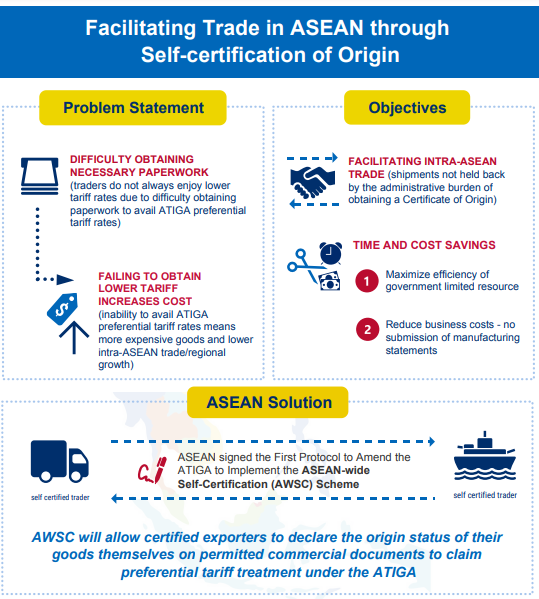The Philippine Bureau of Customs (BOC) has laid out guidelines to execute the newly enforced self-certification scheme within the Association of Southeast Asian Nations (ASEAN).
Customs Memorandum Order (CMO) No. 24-2020, which took effect on September 20, implements the ASEAN-wide Self-Certification Scheme (AWSC) under the First Protocol to amend the ASEAN Trade in Goods Agreement (ATIGA) signed in 2018. The protocol provides for a simplified and streamlined procedure in claiming and availing of ATIGA preferential tariff rates for intra-ASEAN exports.
READ: PH inks ASEAN protocols amending ATIGA, boosting services sector
In place since 2010, ATIGA eliminates import duties for 98.7% of product lines of ASEAN member states.
AWSC is a trade facilitation initiative that authorizes qualified exporters to self-certify the origin status of their goods to make them eligible for ATIGA tariff preferences. The certified exporter status may be used instead of the certificate of origin (CO) Form D, which still requires exporters to apply for every shipment manually and do so only during office hours on regular work days.
The AWSC promotes convenience and cost savings because it does away with administrative limitations of the CO Form applications, improving distribution timelines so even weekend shipments will not be delayed, the Department of Trade and Industry earlier said.
With implementation of the AWSC on September 20, certified exporters are now able to make out Origin Declaration to all of the ASEAN member states.
The Origin Declaration is a declaration on the origin of goods exported that a certified exporter must make according to the operational certification procedures of the ATIGA.
CMO 24-2020 covers the originating goods of certified exporters that are exported to and imported from ASEAN member states.
The new CMO sets out the operational procedure for origin declarations and provides guidelines under which customs officers at the Preferential Rate Unit (PRU), or its equivalent unit at the port, will grant tariff rates for goods coming from ASEAN member states using origin declarations.
It also establishes the criteria and operational procedure for the authorization of certified exporters, and establishes export procedures for certified exporters.
BOC’s Export Coordination Division (ECD) will carry out examination of the application for certified exporter status.
The ECD, through the Export Divisions (ED) or its equivalent unit, will monitor use of the authorization and verify correctness or authenticity of Origin Declarations made out by certified exporters.
The ECD or its equivalent unit should also act on retrospective verification requests by customs authorities of importing ASEAN member states on Origin Declarations made out by Philippine certified exporters.
The ECD should also maintain a Philippine AWSC database and monitor all Philippine certified exporters as to their compliance to laws, rules and regulations pertinent to exportations and rules of origin.
The PRU, on the other hand, will evaluate authenticity of the Origin Declaration submitted by importers and grant ATIGA preferential rates accordingly.
The PRU, through the ECD, may also request for verification should it doubt authenticity of the Origin Declaration made out by certified exporters from other ASEAN member states or the accuracy of the information regarding the origin of their goods.
Exporters intending to be certified can submit their applications in both hard copy and electronic portable document format (PDF) to the Assessment and Operations Coordinating Group (AOCG) through BOC’s Customer Care Center (CCC).
After evaluating the application and finding it in order, the ECD will recommend to the AOCG deputy commissioner the granting of certified exporter status and prepare the written authorization within 15 working days from date of receipt of application. Otherwise, it will be recommend the disapproval of the application, stating the reason for the denial.
A certified exporter will be included in the Philippine AWSC database for at least three years from the date of granting of status.
CMO 24-2020 repeals CMO 18-2015 (guidelines in the implementation of the second pilot project of the ASEAN Self-Certification System and of certified exporters) and all other inconsistent rules and regulations. – Roumina Pablo









